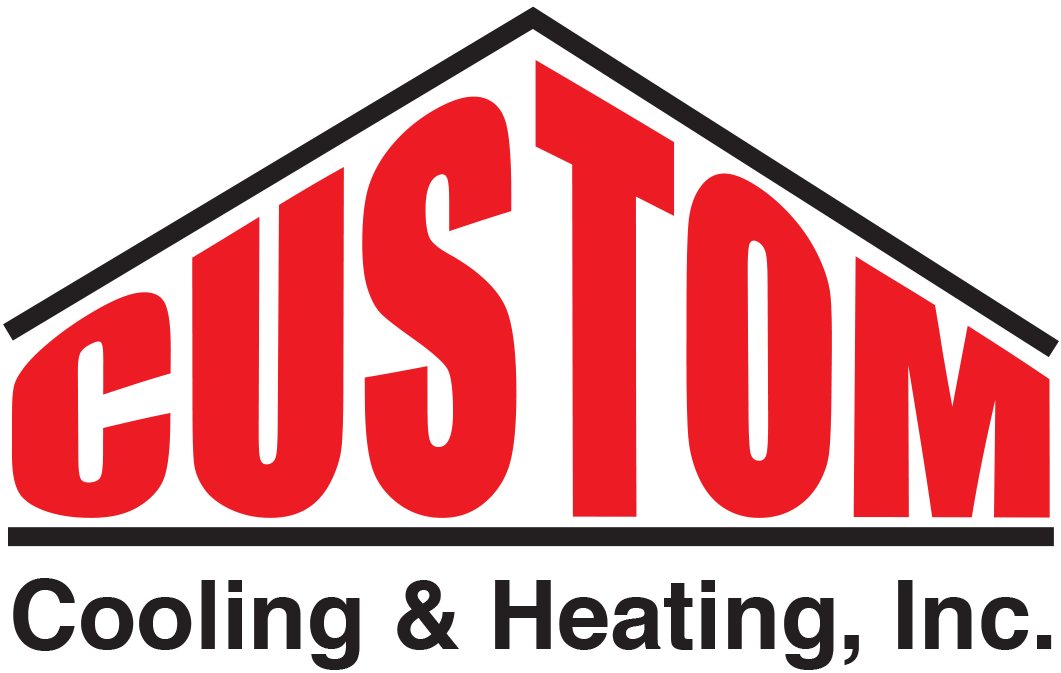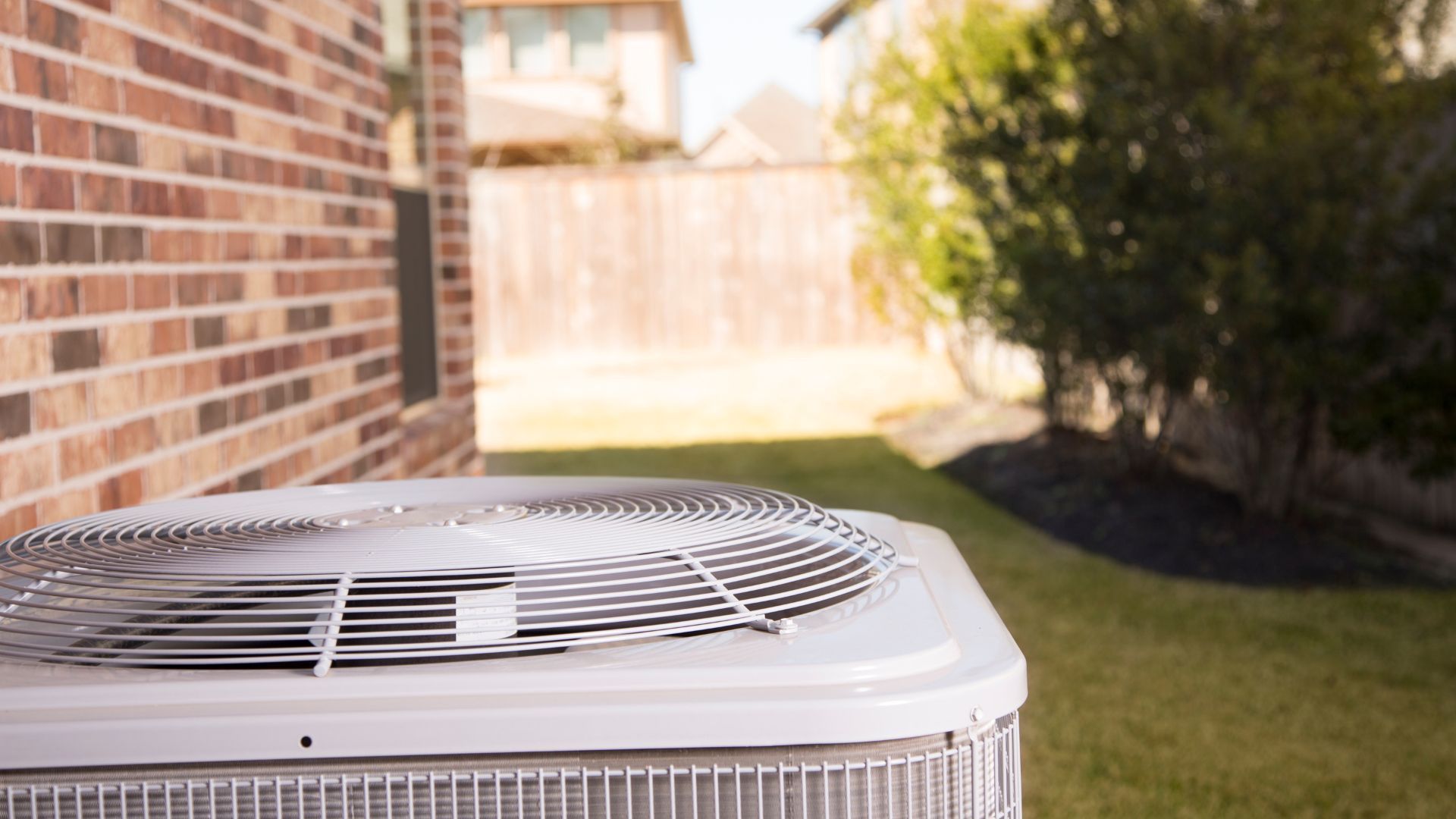Blog

When temperatures plunge and your home suddenly feels more like a walk-in freezer, a broken heater can be more than an inconvenience, it can be an emergency. The middle of winter is the worst time to be without heat but knowing what steps to take can help protect your home, your family, and your comfort. At Custom Cooling & Heating , we help homeowners restore warmth quickly and safely. Here’s what to do if your heater stops working when you need it most. 1. Check the Basics First Before assuming the worst, start with a few simple troubleshooting steps. Many heating failures are caused by basic issues that can be resolved without a service call. Check your thermostat: Make sure it’s set to “Heat” and that the temperature is set higher than your home’s current indoor temp. If it’s a battery-powered thermostat, swap in fresh batteries. Inspect your circuit breaker: A tripped breaker can shut your furnace down completely. Reset it if necessary. Ensure your furnace switch is ON: Furnaces often have a standard light-switch-style power switch on or near the unit. Make sure it wasn’t accidentally turned off. Look at your air filter: A severely clogged filter can restrict airflow and cause your system to shut down for safety. If the filter looks dusty or blocked, replace it . If these quick checks don’t restore heat, the issue may be deeper inside the system and require professional attention. 2. Avoid Overworking Your System When heat stops flowing, it’s natural to keep adjusting the thermostat, hoping the furnace will kick back on. Try to avoid repeatedly turning the system on and off, as this can make the situation worse or cause damage. Instead, turn the system off if you smell burning, hear unusual noises, or see signs of overheating. These can signal electrical issues or mechanical failures that need a technician. 3. Use Safe Temporary Heating Solutions While waiting for repairs, you'll need to keep your home comfortable, but safety should always come first. Avoid using your oven or grill to heat your home, as these methods are extremely dangerous. Safer alternatives include: Electric space heaters: Keep them on a stable surface, at least three feet from flammable items. Fireplaces: Ensure the flue is open for proper ventilation. Layered clothing and blankets: A simple and safe short-term solution. If indoor temperatures drop too low, consider staying with a friend, family member, or in a hotel to avoid the risk of frozen pipes or health issues. 4. Prevent Your Pipes from Freezing A broken heater doesn’t just affect comfort, but it can also put your plumbing at risk. Frozen pipes can burst and cause significant water damage. To help prevent freezing: Keep cabinet doors open to allow warm air around plumbing. Let faucets drip slowly to keep water moving. If your home has multiple stories, keep doors open between rooms to allow even air circulation. If temperatures in your home drop below 55°F, your pipes may be at risk, so monitor them closely until the heat is restored. 5. Call a Professional HVAC Technician If basic troubleshooting doesn’t resolve the issue, it’s time to call a certified expert . Heating systems have complex electrical, mechanical, and safety components, so attempting repairs without training can be dangerous. At Custom Cooling & Heating, our technicians diagnose heater breakdowns quickly and offer reliable solutions to get your home warm again. Whether it’s a faulty ignitor, blower motor issue, dirty flame sensor, or aging furnace components, we’ll pinpoint the problem and recommend the most cost-effective fix. 6. Consider the Age of Your Heater If your heater is over 12–15 years old, repeated breakdowns may be a sign that it’s time for replacement. Older units lose efficiency, struggle to maintain consistent temperatures, and can increase your energy bills. A new high-efficiency heating system can: Reduce monthly utility costs Improve indoor air quality Deliver more consistent comfort Provide safer, more reliable performance Our team can help you compare repair vs. replacement options, so you can make the best choice for your budget and home. 7. Prevent Future Breakdowns with Regular Maintenance Once your heat is restored, the best way to avoid another winter surprise is to schedule annual furnace maintenance . Preventive service keeps your system running smoothly and can catch small issues before they turn into emergencies. Routine maintenance from Custom Cooling & Heating includes: Full system inspection Cleaning and lubrication Filter replacement Safety checks Efficiency testing Not only does this reduce the risk of winter breakdowns, but it also extends the life of your equipment. Stay Warm with Reliable Winter Heating Support A broken heater in the middle of winter can be stressful, but you don’t have to handle it alone. The experts at Custom Cooling & Heating are here to restore your comfort quickly and safely. Whether you need emergency repairs , routine maintenance , or a new system installation , our team is ready to help. Need fast heating service? Contact Custom Cooling & Heating today and let us bring the warmth back to your home.

As cold weather approaches in Nebraska, keeping your home warm without watching your energy bills skyrocket is a top priority. At Custom Cooling & Heating , we specialize in heating design, installation, maintenance, and repair services across Lincoln and surrounding communities. In this blog, we’ll walk through best practices to heat your home efficiently, lower energy costs, and prolong the life of your heating system. 1. Choose the Right Heating System for Your Home One of the biggest factors in efficiency is selecting the proper heating system based on your home’s size, insulation, ductwork, and climate. Whether you’re considering a high-efficiency furnace, a heat pump, or a hybrid system, proper sizing and design are crucial. Over‑sized systems may cycle on and off too frequently (wasting energy), while under‑sized systems may struggle to maintain comfort. 2. Perform Annual Maintenance & Tune‑Ups Even the best heating system loses efficiency if it isn’t maintained. For peak performance: Have your furnace or heat pump inspected and cleaned each year before peak use. Clean or replace air filters on schedule, every 1–3 months depending on model and usage. Order yours online through Custom Cooling & Heating here . Check for and seal duct leaks; leaky ducts waste heat by dumping warm air where it’s not needed. Make sure vents and registers are unobstructed by furniture, carpets, or drapes. Lubricate motors, tighten electrical connections, and confirm thermostat calibration. These steps ensure your system works less hard, reducing fuel or electricity use. 3. Optimize Thermostat Settings & Use Zoning Smart thermostat strategies can yield significant savings: Lower your thermostat when the home is unoccupied or overnight (e.g. 3–5° cooler). Use a programmable or smart thermostat to automate temperature changes. Consider zoning—divide your home into zones with separate thermostats, so you aren’t heating unused areas. Avoid frequently raising or lowering your thermostat drastically, as large swings force the system to work harder. Each degree you lower your thermostat can translate to noticeable savings over the heating season. 4. Improve Home Envelope & Insulation Your heating system’s effectiveness is only as good as your home’s ability to retain heat. A tight, well-insulated building envelope reduces heat losses and helps your system run less. Add or upgrade attic insulation. Seal gaps around windows, doors, and duct penetrations with caulk or weatherstripping. Use insulated curtains or window coverings. Insulate HVAC ductwork in unconditioned spaces (basements, attics). Consider adding storm doors/windows or better glazing in colder climates. Better insulation keeps the warmth in — resulting in lower heating demand. 5. Monitor Energy Usage & Take Advantage of Incentives Keep an eye on your monthly energy usage. If you notice spikes or trends upward, it may signal inefficiencies or failing components. Additionally: Check whether utility incentives, rebates, or tax credits are available when you replace a heating system with high-efficiency equipment. Many rebates apply for furnaces, heat pumps, or duct upgrades. Work with your HVAC contractor to ensure installations meet eligibility criteria. Smart upgrades now can pay off long term in lower bills and better system longevity. 6. Call on Professionals for Repairs & Upgrades If your heating system is underperforming—frequent cycling, uneven heating, loud noises, or rising bills—don’t wait until it fails. Call Custom Cooling & Heating for prompt repair or upgrade. Our licensed technicians offer residential heating repair, replacement, and preventive service across Lincoln and surrounding areas. We’re also BBB‑accredited with over 40 years in business. When you partner with experts, you ensure: Correct diagnosis of inefficiency sources Safe and optimized installation and repairs Long-term support and maintenance Heating Efficiently Isn’t Just About Comfort — It’s Smart Savings Heating your home efficiently in Nebraska’s colder months can make a big difference in your energy bills, system lifespan, and indoor comfort. By combining smart equipment choices, regular maintenance , good insulation, intelligent thermostat use, and professional services , you set yourself up for a warmer home and lower heating costs. If you’re ready to optimize your heating system or want an estimate on a new, efficient unit, contact us today. We’ll guide you through options tailored to your home, climate, and budget, so your heating bills stay in check all season long.
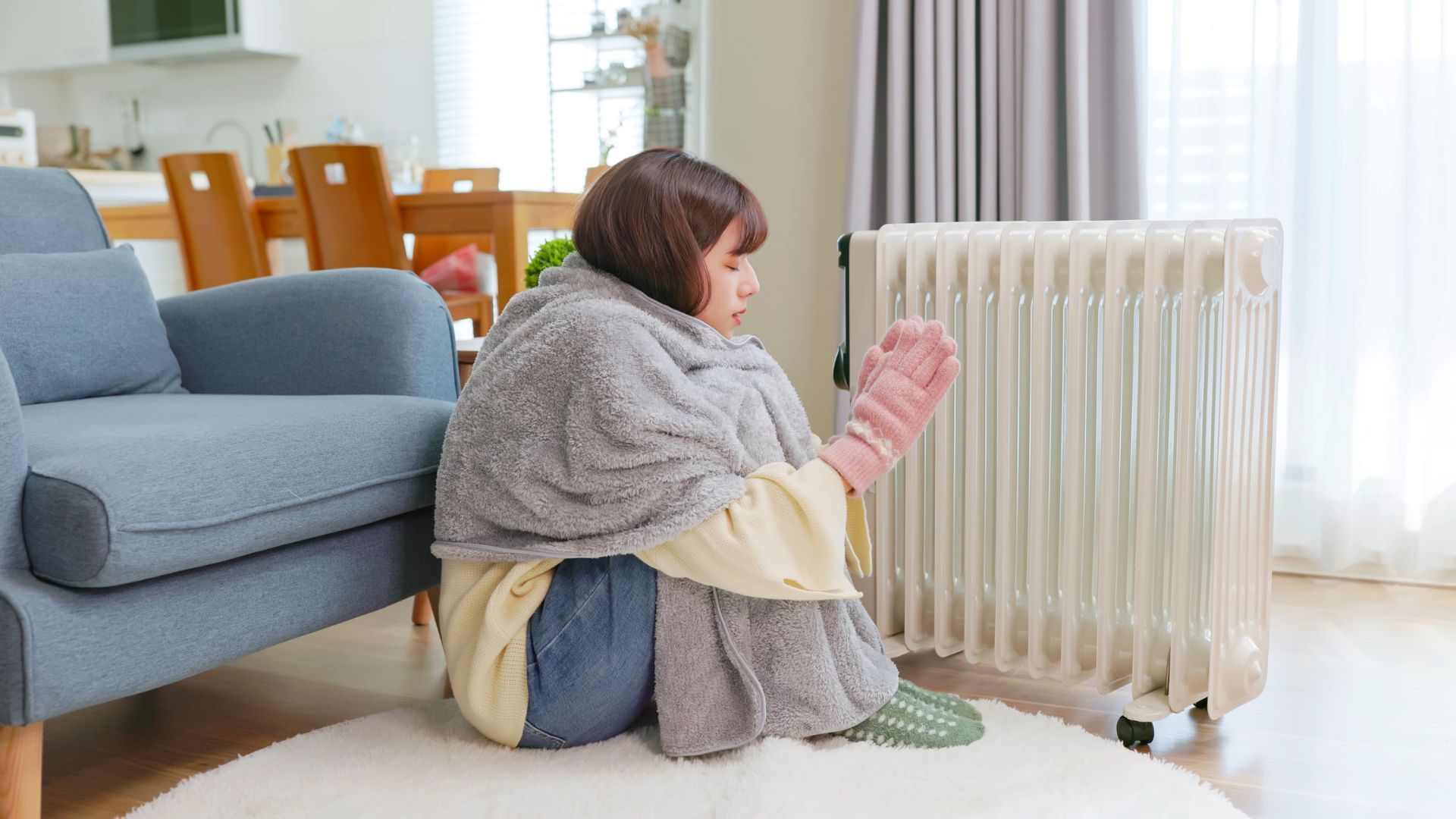
As winter approaches, making sure your heating, ventilation, and air conditioning (HVAC) system is ready is essential. A properly maintained system keeps your home comfortable, saves energy, and helps avoid costly repairs when the cold hits hardest. At Custom Cooling & Heating , we provide heating and cooling design, installation, and service in Lincoln, Nebraska and the surrounding area. Here’s how you can get your HVAC ready for winter — and why choosing a reliable local HVAC company matters. 1. Schedule a Professional Tune-Up One of the most important steps is to have a technician inspect and tune up your HVAC system before the cold sets in. A professional winter check can include: Inspecting and cleaning the furnace or heat exchanger Checking the blower motor, belts, and bearings Testing safety controls, pilot light (if applicable), and gas connections Verifying thermostat calibration and settings This helps ensure your system runs efficiently and safely when you need it the most. 2. Replace or Clean Air Filters Clogged filters restrict airflow and force your system to work harder, increasing energy costs and wear. For winter: Replace disposable filters or clean reusable filters Use high-quality filters (like pleated or HEPA, if compatible) Check filters monthly since heating systems run continuously This small step often yields big energy savings and better indoor air quality.
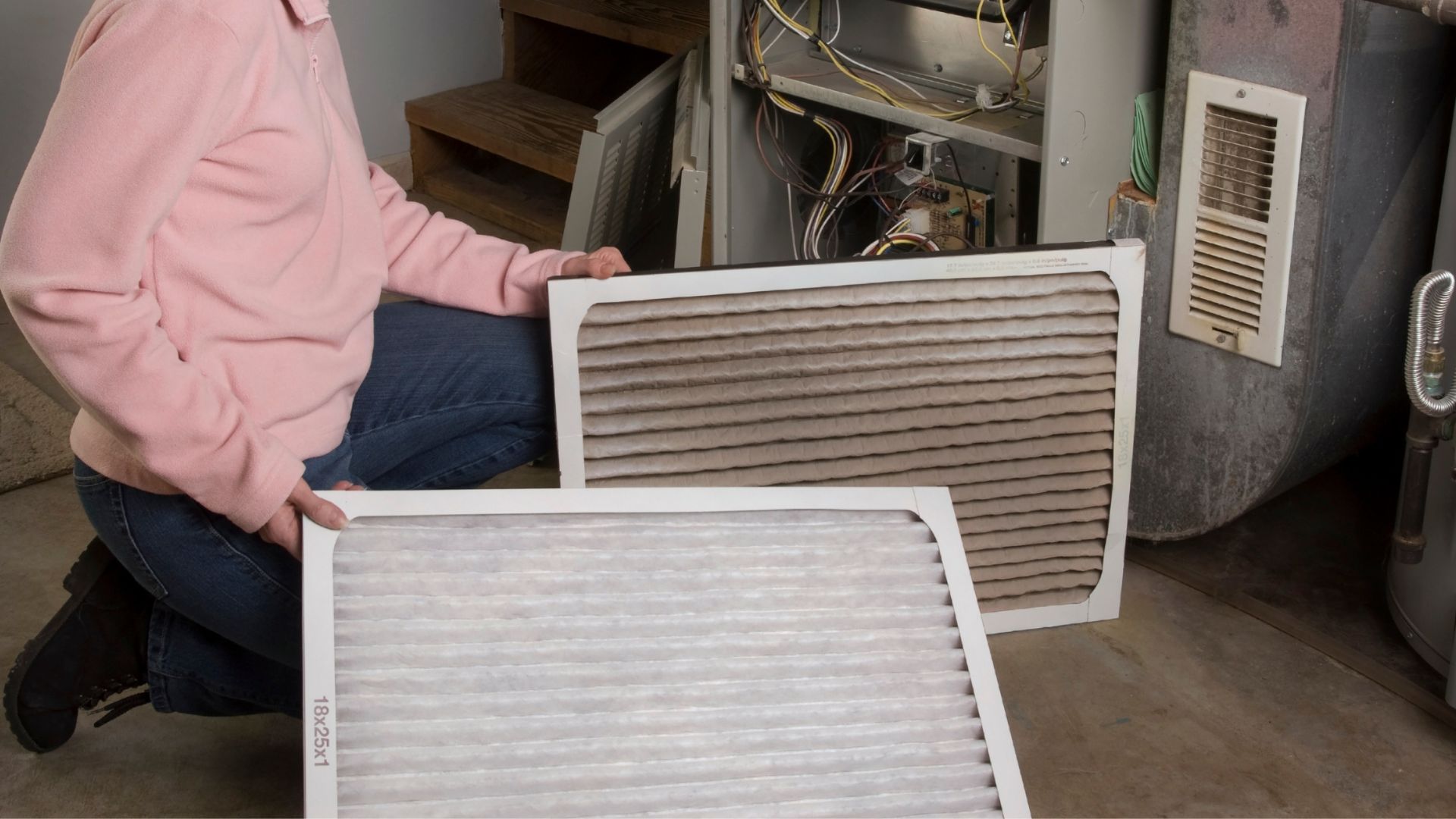
When it comes to keeping your home comfortable and your HVAC system running efficiently, one of the simplest and most overlooked tasks is changing your air filter. It’s a small component with a big impact on indoor air quality, energy efficiency, and even your health. That’s why Custom Cooling & Heating is excited to announce a new way to make this essential maintenance step easier: you can now purchase air filters directly from our website. Whether you need a standard replacement or a high-efficiency option, we’ve got the right filter for your system and your lifestyle. Why Air Filters Matter Your HVAC system’s air filter is responsible for trapping dust, pollen, pet dander, mold spores, and other airborne particles before they circulate through your home. Over time, these filters become clogged, reducing airflow and forcing your system to work harder. Here’s what a clean air filter helps you achieve: Improved indoor air quality Lower energy bills Extended HVAC system lifespan Reduced allergens and respiratory irritants Neglecting to change your filter regularly can lead to poor performance, higher utility costs, and even costly repairs. How Often Should You Change Your Air Filter? The answer depends on several factors: Standard filters : Every 30–60 days High-efficiency filters : Every 90 days Homes with pets or allergies : Every 30 days Vacation homes or low-occupancy spaces : Every 90+ days If you’re unsure which filter is right for your system or how often to change it, Custom Cooling & Heating is here to help. Our team can recommend the best option based on your home’s needs and your HVAC setup. Signs It’s Time to Replace Your Air Filter Even if you’re not tracking the calendar, your home may be telling you it’s time for a new filter. Watch for these signs: Dust buildup around vents and on surfaces Reduced airflow from registers Unusual odors when the system runs Increased allergy symptoms or respiratory irritation Higher energy bills without a change in usage Replacing your filter is a quick fix that can make a noticeable difference in comfort and air quality. Why Buy Air Filters from Custom Cooling & Heating? We know you have options when it comes to buying air filters—but here’s why purchasing directly from us makes sense: Quality You Can Trust We only stock filters that meet our performance standards and are compatible with the systems we install and service. Expert Guidance Not sure which filter fits your unit? Our team can help you choose the right size, type, and efficiency rating. Convenient Ordering Browse our selection online and have your filters shipped directly to your door—no more last-minute hardware store runs. Support Local When you buy from Custom Cooling & Heating, you’re supporting a trusted local business that’s been serving the community for over 40 years. Save with Auto Delivery Save 10% when you sign up for Auto Delivery Types of Filters We Offer We carry a range of filters to suit different systems and preferences: Standard fiberglass filters for basic protection Pleated filters for improved particle capture High-efficiency filters (HEPA) for allergy and asthma relief And more! We carry hundreds of options. Each product listing includes sizing information, MERV ratings, and recommendations for replacement frequency. Ready to Breathe Easier? Changing your air filter is one of the easiest ways to improve your home’s comfort and efficiency. And now, with Custom Cooling & Heating’s new online store, it’s easier than ever to stay on top of this important task. Visit our website today to browse our selection of air filters and place your order. If you have questions or need help choosing the right filter, contact us , we’re here to help you breathe easier.

Achieving the perfect indoor climate in every room of your home can be a challenge, especially when different family members have varying temperature preferences. If you find yourself constantly adjusting the thermostat to accommodate different areas of your home, a home zoning system could be the solution you need. At Custom Cooling & Heating, we specialize in innovative HVAC solutions , including home zoning systems, to provide enhanced comfort, energy efficiency, and cost savings. What is a Home Zoning System? A home zoning system divides your house into multiple climate-controlled areas, allowing you to set different temperatures for each zone. This system utilizes dampers within the ductwork and individual thermostats for each zone, giving you precise control over your home’s heating and cooling. Whether you want to cool the upstairs bedrooms while keeping the downstairs warmer, or adjust temperatures based on room usage, a zoning system makes it possible. Due to each home having a different duct design, Custom Cooling & Heating, INC will perform an onsite evaluation of the duct system and offer specific solutions for your system. Key Benefits of Home Zoning Systems 1. Enhanced Comfort for Every Room Traditional HVAC systems often create temperature inconsistencies, making some areas too hot or too cold. Zoning systems allow for customized climate control, ensuring every room stays at a comfortable temperature for its occupants. 2. Increased Energy Efficiency With a home zoning system, you can direct heating and cooling only where it’s needed, reducing energy waste. By not conditioning unoccupied areas, your HVAC system operates more efficiently, leading to lower energy consumption. 3. Lower Utility Bills By using energy more effectively, a zoning system can significantly cut down your monthly heating and cooling costs. According to the U.S. Department of Energy , homeowners can save up to 30% on energy bills with a properly installed zoning system. 4. Prolonged HVAC System Lifespan A traditional HVAC system works harder to maintain a uniform temperature throughout the entire home, leading to more wear and tear. A zoning system reduces strain on your HVAC unit, helping to extend its lifespan and reduce the need for frequent repairs. 5. Personalized Temperature Control Each zone in your home will have its own thermostat, allowing family members to set their preferred temperatures in different areas. This eliminates thermostat battles and ensures comfort for everyone. 6. Ideal for Multi-Story Homes & Large Spaces Homes with multiple floors often experience temperature imbalances. A zoning system helps regulate temperatures more effectively, keeping upper floors from getting too warm in the summer or too cold in the winter. Is a Home Zoning System Right for You? A home zoning system is ideal for homeowners who: Live in a 2-story home and are not comfortable on the 2nd floor Have rooms that are rarely used and don’t need constant heating or cooling. Experience noticeable temperature differences between floors or rooms. Want to reduce energy waste and lower their utility bills. Have family members with different temperature preferences. Experience the Benefits with Custom Cooling & Heating At Custom Cooling & Heating, we specialize in designing and installing home zoning systems tailored to your needs. Our expert team can assess your home’s layout and heating/cooling demands to create an efficient, customized solution that maximizes comfort and energy savings. If you’re ready to enhance your home’s climate control and efficiency, contact Custom Cooling & Heating today to learn more about our home zoning system solutions!

A detached garage, workshop, or outbuilding can be a game-changer for homeowners and businesses. Whether you're using it as a workspace, hobby area, man cave, or she-shed, keeping the space comfortable year-round is essential. However, heating and cooling an outbuilding isn’t as simple as adjusting the thermostat in your home. It requires the right equipment, proper insulation, and an expert touch to ensure efficiency and effectiveness. That’s where Custom Cooling & Heating, Inc. comes in—offering customized HVAC solutions designed specifically for your space. Here’s our tips to heating and cooling your outbuilding or detached garage. Why Heating and Cooling Matter in Your Outbuilding Many people assume they can get by with an old space heater or a window AC unit, but these are often inefficient, expensive to run, and unsafe. Proper climate control provides several benefits, including: Year-Round Comfort: Whether you’re working in the dead of winter or the heat of summer, your space remains comfortable. Equipment and Material Protection: If you store tools, paint, electronics, or vehicles in your outbuilding, temperature fluctuations can cause damage. Energy Efficiency: A well-planned heating and cooling system, combined with proper insulation, saves you money compared to makeshift solutions. Air Quality & Ventilation: Proper HVAC solutions improve air quality by reducing humidity, dust, and pollutants. Proper Insulation: The Key to Efficiency Before installing heating and cooling, proper insulation is crucial for maintaining efficiency and keeping costs low. Without adequate insulation, your system will have to work harder, leading to higher energy bills and uneven temperatures. Recommended insulation options include: Spray Foam Insulation – Best for air-sealing and providing high R-value per inch. Fiberglass Batts – A cost-effective and easy-to-install option for walls and ceilings. Rigid Foam Board – Ideal for insulating garage doors and concrete walls. Blown-in Insulation – Great for attics and hard-to-reach spaces. Choosing the Right Heating and Cooling System There are several HVAC options for outbuildings, each with its own advantages. Custom Cooling & Heating, Inc. specializes in helping you choose the best system for your specific needs. 1. Mini-Split Heat Pumps: The Most Versatile Option Ductless mini-split heat pump systems are one of the best choices for heating and cooling detached spaces. They offer: Energy efficiency – Uses inverter technology to adjust output based on demand. Zoned control – You can heat or cool only when needed. No ductwork required – Easier installation compared to traditional HVAC systems. Year-round performance – Provides both heating and cooling in one system. 2. Overhead Radiant Heat: Efficient and Even Heating For workshops or garages where dust or air movement is a concern, overhead radiant heating is an excellent option. Silent and efficient – Radiant heat warms objects, not just the air. No ductwork required – Ideal for open spaces with high ceilings. Great for workspaces – Keeps floors and workbenches warm, making it a popular choice for mechanics and woodworkers. 3. Forced Air Unit Heaters: High Heat Output Forced air unit heaters are a popular choice for larger garages and commercial spaces. Powerful heating – Can quickly warm up large spaces. Ceiling-mounted options – Saves floor space and distributes heat evenly. Gas or electric options – Choose the best energy source for your setup. 4. Packaged HVAC Units for Larger Spaces For larger workshops or outbuildings, a small forced-air furnace and AC system might be the best choice. While requiring ductwork, it delivers whole-space comfort and excellent efficiency. 5. Radiant Floor Heating for Ultimate Comfort If you're building or renovating your outbuilding, consider radiant floor heating for efficient, even heat distribution without blowing air or taking up wall space. 6. Typical Furnace: A Reliable Heating Solution A standard furnace installation can be an effective choice for larger outbuildings. Consistent and reliable – Provides a steady source of heat. Can be combined with central AC – Making it a complete climate control solution. Fuel options – Available in natural gas, propane, or electric models. Installation: Why Professional Setup Matters Improper installation can lead to higher energy bills, poor performance, and safety hazards. At Custom Cooling & Heating, Inc., our expert technicians ensure: Correct sizing – Too big or too small of a unit can be inefficient. Proper ventilation – Essential for gas heating and overall air quality. Smart placement – Optimizing airflow and performance. Seamless integration – Making sure your system works with any existing structures or utilities. Get a Custom HVAC Solution for Your Outbuilding Today Don't settle for a cold workshop in the winter or a stifling garage in the summer. Custom Cooling & Heating, Inc. specializes in designing and installing heating and cooling solutions tailored to your unique needs. Our team ensures professional installation, energy efficiency, and long-term comfort. Ready to transform your outbuilding? Contact us today for a consultation and get the perfect HVAC system for your space! Custom Cooling & Heating, Inc. | Lincoln, NE | Expert HVAC Solution
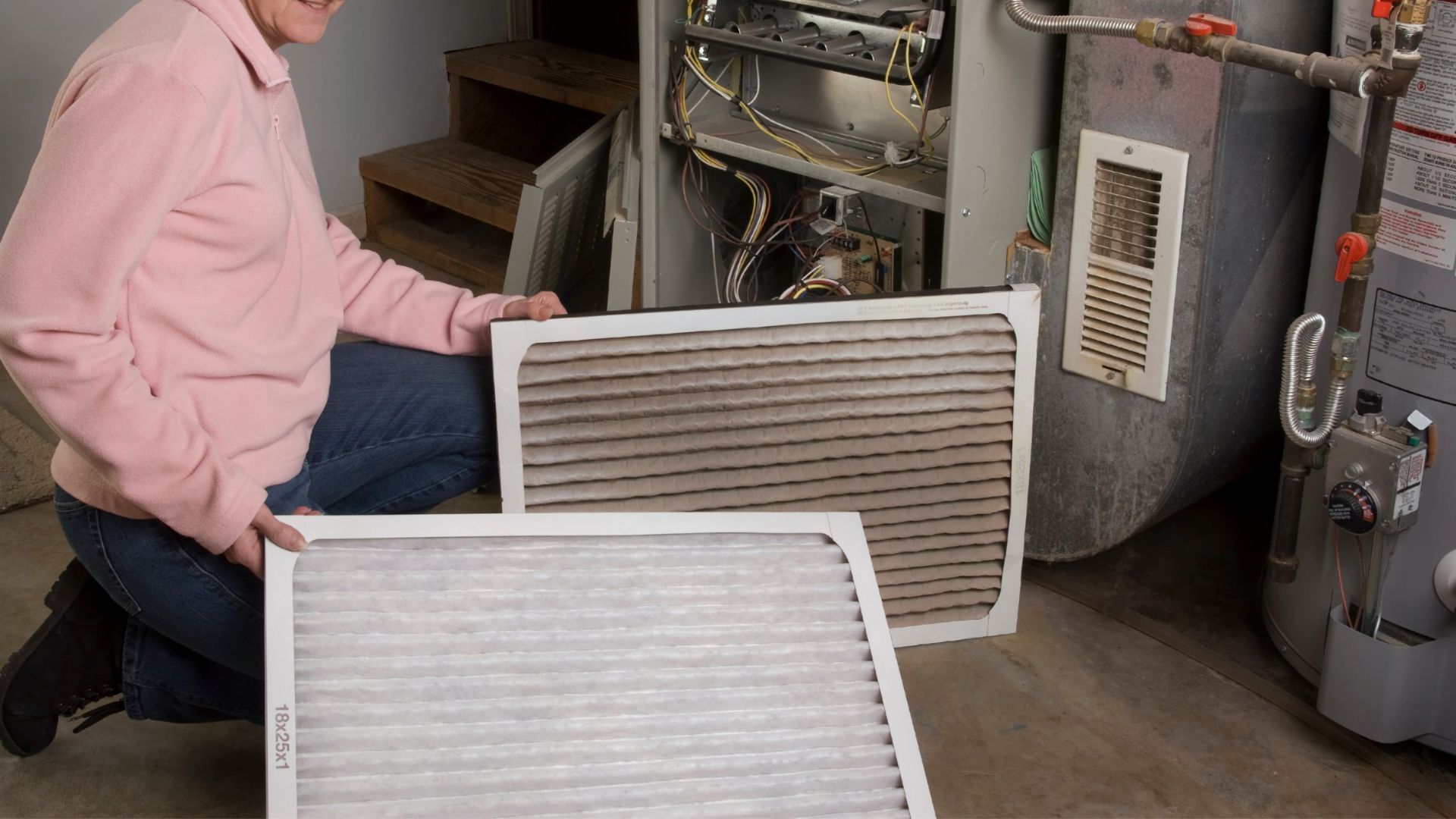
When the temperatures drop, a broken furnace can quickly turn into a major headache. Before calling for professional help, there are a few simple checks you can perform to potentially identify and resolve the issue. Here are some common furnace problems and what you should check when it’s not working. 1. Check the Thermostat The thermostat is the control center for your furnace, and often, furnace issues can stem from a simple thermostat setting or power issue. Here’s what to do: Ensure it’s on and set to “Heat”: Double-check that the thermostat is powered on and set to the heating mode. Check the temperature setting: Make sure the temperature is set higher than the current room temperature. Replace the batteries: If your thermostat uses batteries, low power could cause it to malfunction. 2. Inspect the Power Source Your furnace won’t work if it’s not receiving power. Take these steps to make sure it’s properly connected: Check the circuit breaker: Look for any tripped breakers in your electrical panel and reset them if necessary. Examine the furnace switch: Many furnaces have a dedicated power switch near the unit. Ensure it’s in the “On” position. 3. Replace the Air Filter A clogged air filter can restrict airflow, causing your furnace to shut down or operate inefficiently. Follow these steps: Locate the air filter, which is usually near the return air duct or the furnace itself. Check if the filter is dirty or clogged with debris. Replace the filter with a clean one, ensuring it’s the correct size and type for your furnace. 4. Check the Pilot Light or Ignition System If you have a gas furnace , your furnace uses a pilot light, which needs to stay lit for the system to function. For newer models with electronic ignition, the ignitor may need troubleshooting. Here’s what to check: Pilot light: If it’s out, carefully follow your furnace’s instructions to relight it. If it won’t stay lit, there could be a problem with the thermocouple. *Most furnaces that are older than 35 years will have a standing pilot light and thermocouple. Ignition system: For electronic ignitions, you may need to reset the system or call a professional if it’s not sparking properly. *Most furnaces that are 30 years old and newer will have an ignition system that either sparks or glows to light the pilot or burners. Try shutting the power off and turning it back on to reset the system and the furnace will try the ignition sequence again. 5. Ensure the Furnace Door is Secure Many furnaces have a safety switch that prevents them from operating if the access door isn’t properly closed. Ensure the door is securely latched. 6. Look for Blocked Vents or Registers Blocked vents can disrupt airflow and cause your furnace to stop working or overheat. Inspect all vents and registers to: Make sure they’re open and unblocked by furniture or other objects. Remove any visible dust or debris obstructing airflow. 7. Examine the Furnace’s Drainage System If your furnace is a high efficient model that vents to the exterior with PVC pipe, then the condensation from your furnace needs to drain properly. A clogged condensate drain line can trigger safety mechanisms that shut down the system. Check: For water pooling near the furnace . If the drain line is clogged or frozen and clear it if necessary. 8. Examine the Furnace’s exhaust pipe If your furnace is a high efficient model that vents to the exterior with PVC pipe, then the pipes may be covered by a snow drift or be frosted over outside. You can check the type that vent out the sidewall and clear the area as necessary. If your furnace termination vent is on the roof then leave that inspection for a professional as roof access is dangerous, especially during the winter. Once the exhaust and inlet pipes are clear, please shut the power off to furnace and turn back on to reset the control board and re-start the ignition sequence. 9. Listen for Unusual Noises Strange noises can signal specific problems: Banging or rattling: Could indicate loose parts or lack of airflow due to plugged filter or vents. Whistling or squealing: Might point to airflow restrictions or a worn blower belt. Grinding or metal on metal scraping: combustion blower/inducer assembly may be failing, or blower motor / assembly may be failing. While these checks can help address minor issues, some furnace problems require professional attention. If you’ve gone through this list and your furnace still isn’t working, it’s time to call the experts. Expert Furnace Repairs and Installations in Lincoln, NE At Custom Cooling and Heating, we understand how important a functioning furnace is during the colder months. Our experienced technicians are ready to diagnose and fix any HVAC issue to ensure your home stays warm and comfortable. Contact us today for prompt and reliable service!
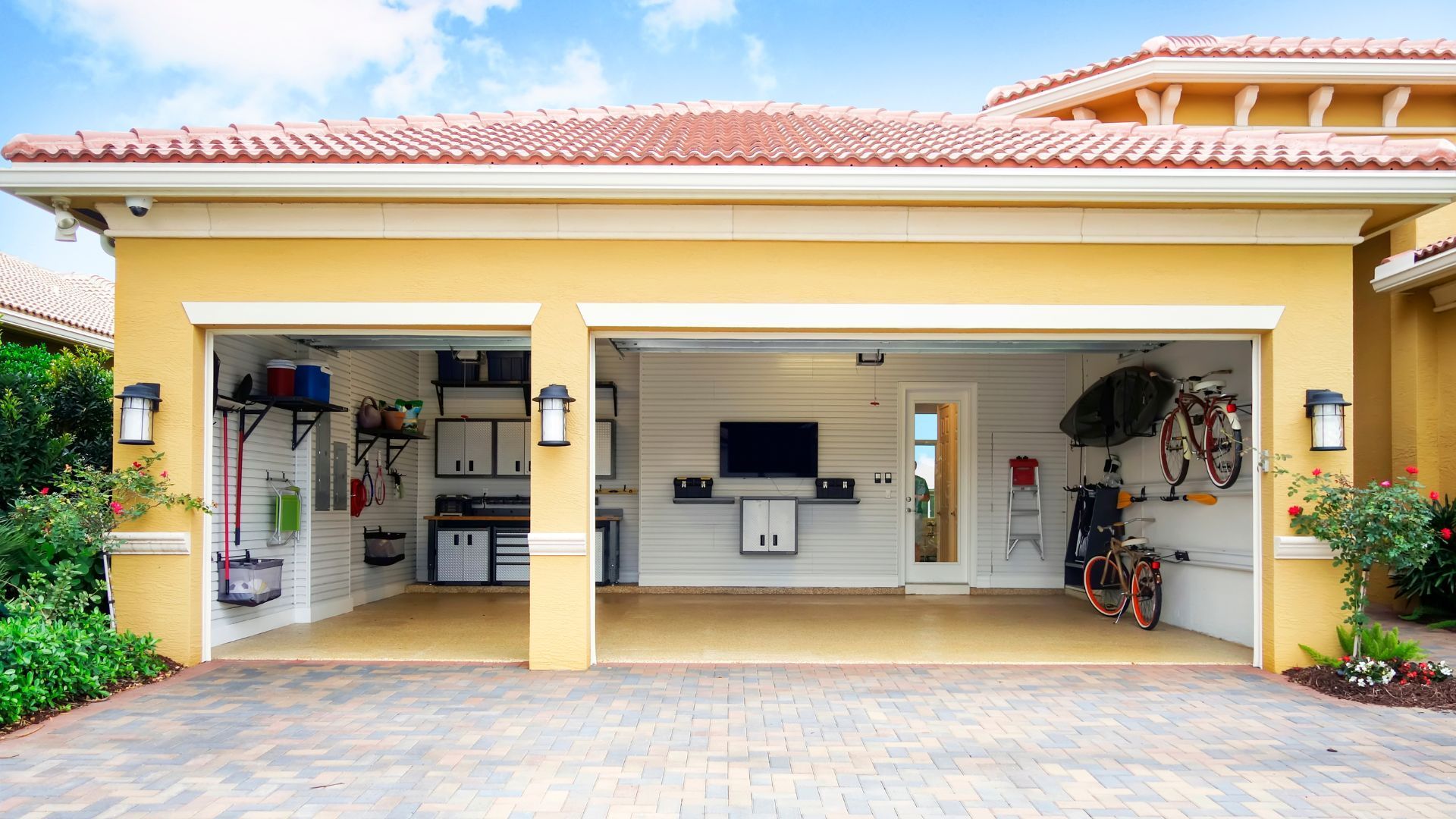
Your garage is more than just a place to park your car or store tools—it’s a versatile space that can serve as a workshop, gym, home office, or even a hangout spot. But whether you're working on DIY projects, exercising, hosting friends, watching your favorite game, or simply using the space for extra storage, one thing is clear: comfort matters. If you've ever found your garage too cold to work in during winter or too hot in the summer, you know how important it is to have a climate-controlled space. Here’s your ultimate guide to heating and cooling your garage year-round. Why Should You Heat and Cool Your Garage? Before diving into the best systems and methods, let’s look at why it’s beneficial to regulate the temperature in your garage: Year-Round Comfort: Extreme temperatures can make a garage feel uninhabitable during certain months. Heating your garage in the winter keeps it usable for projects, hobbies, or even parking your car. Cooling it during the summer ensures a more comfortable space for work or relaxation. Protecting Your Equipment: Sensitive tools, electronics, and vehicles can suffer damage from extreme temperatures. Heating and cooling help protect your investment by keeping everything in good working condition. Keeping items from freezing, having a climate-controlled space for pets, and stored items from sweltering heat are all great reasons to heat & cool a garage space. Increased Home Value: A climate-controlled garage adds usable square footage to your home. Whether you’re using it as a living area, home office, or storage space, a comfortable garage can increase the overall value of your property. Energy Efficiency: Modern heating and cooling systems are more energy-efficient than ever. With the right equipment, you can save on energy costs while still maintaining a comfortable environment. Best Heating Options for Your Garage When it comes to heating your garage, you want a solution that’s effective and cost-efficient, without wasting energy. Here are some of the best heating options: 1. Space Heaters For smaller garages or quick spot heating, portable space heaters can be an affordable option. They’re easy to move and store and come in both electric and propane varieties. However, they may not provide even heating across larger spaces. 2. Electric Garage Heaters Electric garage heaters are an excellent option for consistent heat. They come in wall-mounted or ceiling-mounted versions and are designed to provide steady warmth without taking up much space. Look for models with adjustable thermostats for better control over your garage’s temperature. Pros: Easy to install, low maintenance, no need for gas lines or venting, safe to use indoors. Cons: Can be more expensive to operate than gas-powered heaters. These units typically take a larger 240V circuit which may be difficult to install in a finished garage. 3. Gas Heaters For larger garages or more intense heating needs, a gas-powered heater might be your best bet. These systems are capable of heating bigger spaces faster and more efficiently. Options include natural gas or propane models, both of which require proper ventilation. Many installations are using a low-profile unit heater like a Modine Hot Dawg . Pros: More energy-efficient for larger spaces, lower operating costs compared to electric heaters. Cons: Installation can be more complex, requiring gas lines and venting. 4. Infrared Heaters Infrared heaters provide heat by directly warming objects and people in their path, rather than heating the air. These are great for spot heating and will quickly raise the temperature around you, making it ideal for a garage that doesn’t need to be uniformly heated. Infrared heaters can be purchased in electric or gas (natural or LP) models. Pros: Energy-efficient, fast heating, no need to heat the entire space. Cons: May not be the best option for large, open garages. Ventless infrared heaters are also against code in many municipalities. 5. Radiant Floor Heating Radiant floor heating involves installing electric or hydronic heating systems beneath your garage floor. This option provides consistent heat by warming the floor and allowing the heat to rise into the space. While it’s more expensive to install, it offers a luxurious level of comfort, particularly in cold climates. Pros: Even heat distribution, comfortable, energy-efficient in the long run. Cons: High initial installation costs and must be completed before concrete is poured.
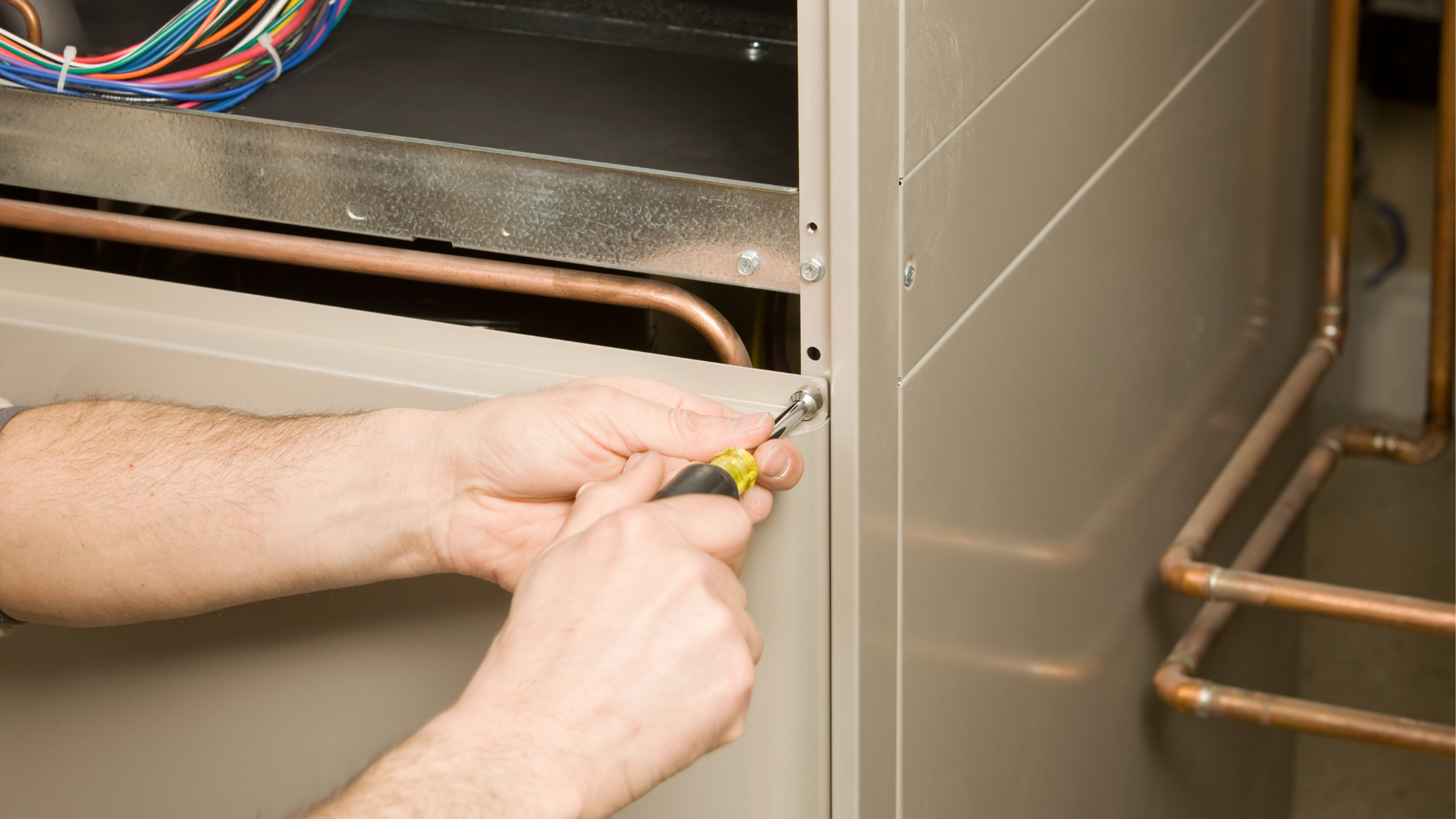
Just can’t seem to get your home warm enough in cooler temperatures? Well, it may be time to upgrade your heating system! Yet, with so many different types of systems to choose from, how do you know which one is right for you? Custom Cooling & Heating is here to help you navigate that decision-making process. So, let’s talk about furnaces. In this blog, we’ll answer the question “How do I choose between an electric vs. gas furnace?” 1. Efficiency and Operating Costs Electric furnaces are known for their 100% efficiency (buy $1 of electricity and get $1 worth of heat) and typical lower installation costs compared to gas furnaces. They don't need a flue or vent , so that makes the installation process easier and less expensive than gas furnaces. The downside to electric furnaces is that they can be more costly in the long run to operate in areas with higher electricity rates and sometimes the home doesn’t have the adequate electrical panel size or space for the electric furnace. On the other hand, gas furnaces typically have lower operating costs, especially in areas where natural gas is readily available and fairly affordable. The initial investment may be higher, but the long-term savings on energy bills can definitely offset those costs, especially if you chose a 96% - 97% efficiency gas or propane furnace. 2. Performance and Comfort Gas furnaces are known for their incredible heating abilities. They can warm up spaces of any size and any temperature, getting the job done quickly and efficiently. They provide consistent heat, which can be especially comforting in colder climates. All new models have a high efficiency blower and many have 2-stage or multi-stage heating capability. Electric furnaces may be efficient, but they might struggle to keep up with that same level of heating performance as gas furnaces, particularly in extreme cold conditions. Electric furnaces are typically coupled with heat pumps allowing them to only needed during colder temperatures. Electric furnaces typically have a louder blower noise due to their design. 3. Environmental Impact & Sustainability Electric furnaces produce zero emissions while in use, making them a cleaner and more environmentally friendly option. Electric furnaces are considered a more sustainable choice, bonus points if they’re powered by renewable energy sources like solar or wind. Keep in mind a lot of our electrical energy in the midwest comes from either coal fired or natural gas power plants. While gas furnaces are efficient, they do produce emissions during combustion, contributing to air pollution and greenhouse gas emissions. Luckily, modern technology allows for more environmentally friendly options with lower emissions. There is not a lot of wasted energy in the combustion process of a 95% or 97% furnace. 4. Installation and Maintenance Electric furnaces are typically easier to install and require less maintenance than gas furnaces. Because they don't require a flue or chimney, there are no concerns about carbon monoxide leaks or gas line connections. Electric furnaces still need maintenance but there are less components internally to fail than a typical gas furnace. Gas furnaces require proper venting and combustion air supply, which might require additional installation considerations. They also need regular maintenance, including annual inspections and cleaning of the burner and flue. Making the Right Choice Choosing between an electric and gas furnace ultimately depends on what your specific needs, budget, and priorities are. If you’re looking for energy efficiency and environmental sustainability, an electric furnace may be the way to go. But if heating capabilities and lower operating costs fit your needs better, a gas furnace may be the better choice for you. At Custom Cooling & Heating, we're here to help you make an informed decision and find the perfect HVAC system solution for your home. Contact us today to learn more about our furnace options and schedule a consultation with one of our experts.
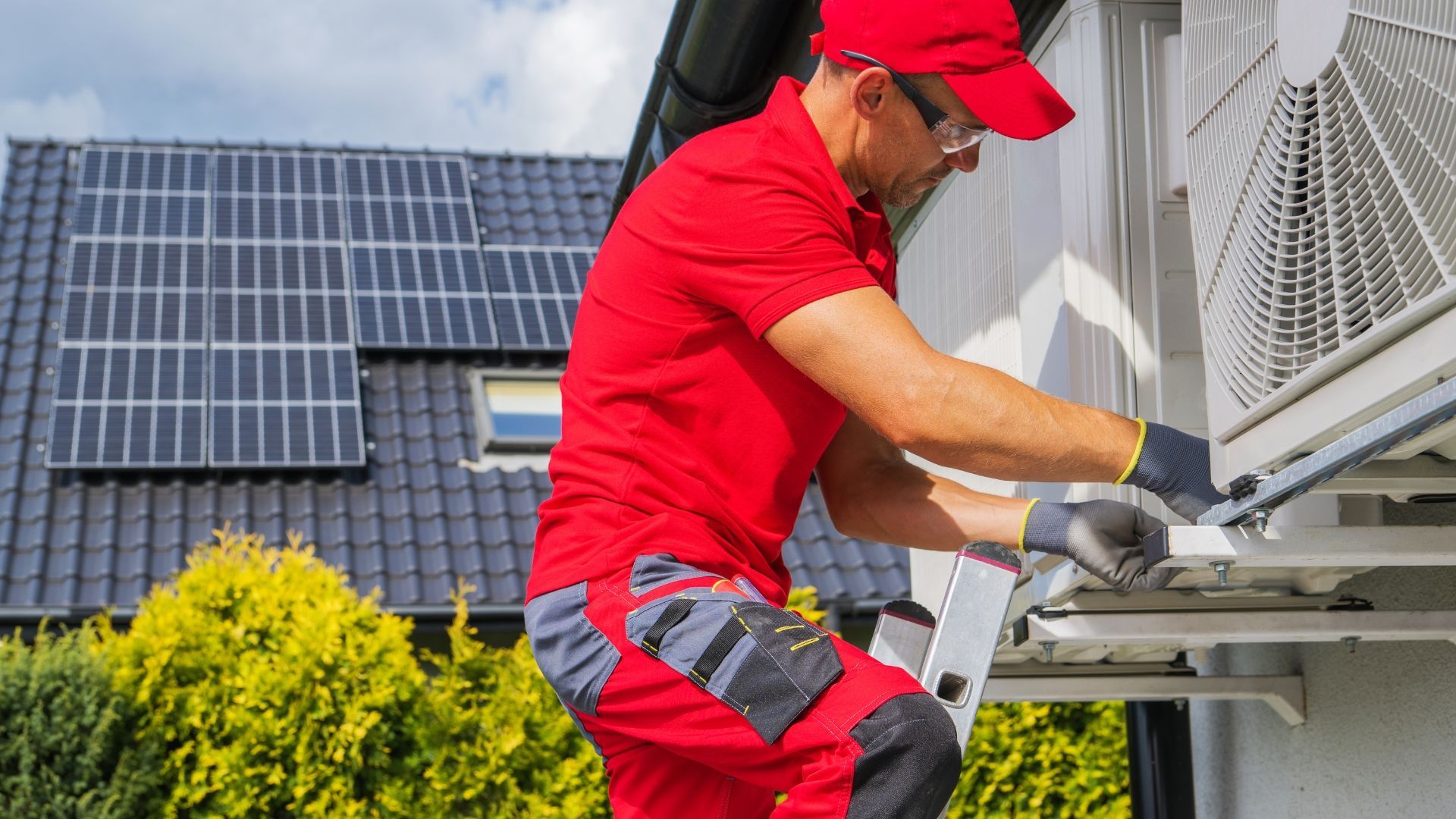
Choosing the right climate control system is a big deal when it comes to keeping your home comfortable year-round. For many homeowners, the decision often comes down to choosing between a heat pump and an air conditioner. In this blog, we'll break down the main differences, helping you make an informed decision in choosing between a heat pump vs air conditioner. Understanding Heat Pumps vs Air Conditioners A heat pump is a reliable system that provides both heating and cooling. Unlike traditional heating systems , which generate heat, a heat pump transfers heat from one place to another. In the winter, it takes heat from the outside air (even when it’s cold) and brings it indoors. In the summer, it works like an air conditioner, removing heat from inside your home and releasing it outside. An air conditioner is designed specifically to cool your home. It works by removing heat from the indoor air and blowing it outside. Most air conditioners consist of two main parts: an indoor unit that absorbs the heat and an outdoor unit that gets rid of the heat. While its cooling abilities are great, air conditioners do not offer heating capabilities by themselves. Weighing the Pros and Cons 1. Climate and Efficiency Heat Pump: Heat pumps are effective in both heating and cooling, making them ideal for moderate climates. They can help you save on your energy bills , especially if you live in an area with mild winters and hot summers. Modern heat pumps are made to perform even in colder temperatures, making them versatile for a variety of climates. All heat pumps in the northern climate require a backup heat source (electric, gas or propane furnace). There are tax credits up to $2000 for heat pumps and local utility rebates available to lower the overall cost for installation. Air Conditioner: Best suited for regions where high demand for cooling your home is needed. The more demand for the unit to cool the space the more beneficial high efficiency units are. There are tax credits up to $600 for A/C’s and local utility rebates available to lower the overall cost for installation. 2. Energy Costs and Savings Heat Pump: Although the initial installation cost can be higher, heat pumps usually have lower operating costs due to their dual functionality and energy efficiency. Many homeowners find that heat pumps save money in the long run through reduced energy consumption for heating and cooling the home. This is due to the use of the refrigeration cycle to transfer the heat from outdoors to inside the home. A typical furnace (electric, gas, or propane) uses the energy to create heat, not transfer heat like a heat pump. Air Conditioner: Typically, air conditioners have a lower initial cost compared to heat pumps. They will be coupled with an electric, gas or propane furnace for supplying the heat to the home. Typically heat pumps and A/C’s of a similar make and grade will have the same cooling efficiency. 3. Installation and Maintenance - Heat Pump: Installation of a heat pump can be slightly more complex, especially if you’re converting from an A/C. Regular maintenance is important to ensure efficiency and longevity. A well-maintained heat pump can last up to 12 years and beyond. Heat pumps run year around so inherently the maintenance and tendency for part failure is higher than an A/C. - Air Conditioner: Installation is typically straightforward, especially if you’re replacing an existing unit. Regular maintenance, like cleaning filters and checking refrigerant levels, is essential for the best performance. Air conditioners can typically last up to 15 years and beyond. 4. Environmental Impact Heat Pump: Heat pumps are environmentally friendly since they use electricity to transfer heat rather than burning fossil fuels for heat. They can reduce your carbon footprint and contribute to a greener home. Air Conditioner: Since A/C’s only cool your home, they rely on whatever furnace that it is coupled with to heat your home which may have a larger environmental impact. Choosing a high efficient A/C will lower the need for peak demand on the electrical grid in the summer. Making the Right Choice Choosing between a heat pump and an air conditioner depends on multiple factors, including your climate, budget, and HVAC needs. At Custom Cooling & Heating, our experts can help you assess your specific situation and recommend the best solution for your home. Rely on Us for Your HVAC Needs Contact us today or personalized service and reliable HVAC solutions. Our team of professionals is here to provide personalized advice, top-notch installation, and ongoing support to ensure your home stays comfortable year-round.

Are you searching for ways to improve your comfort at home? Try investing in a whole-home humidifier! Now you may be wondering “what does a whole-home humidifier do?” Whole-home humidifiers help improve indoor air quality, especially during the dry winter months or in areas with naturally low humidity. In this blog, we’ll explore all the ways a whole-home humidifier can improve your home and health. Benefits of a Whole-Home Humidifier 1. Say Goodbye to Dry Air Low humidity levels can lead to dry skin, irritated eyes, and discomfort. A whole-home humidifier maintains standard humidity levels, creating a more comfortable living environment. This can also make your home feel warmer in the winter, reducing the need to turn up the thermostat. 2. Breathe Easy Proper humidity levels can help ease symptoms of respiratory issues, such as dry throat and sinus congestion. It also reduces the likelihood of nosebleeds and can help in reducing the spread of airborne viruses by keeping the mucous membranes moist. 3. Preservation of Home Furnishings Wood furniture, flooring, and musical instruments can suffer from cracking and warping from dry air. A whole-home humidifier protects these valuable items and saves you from costly repairs and replacements by maintaining consistent humidity levels. 4. Less Static Electricity Dry air increases static electricity, which can lead to annoying shocks and damage electronic equipment. A humidifier helps to reduce static build-up and gives you a shock-free environment. 5. Save on Your Energy Bills Maintaining proper humidity levels can reduce the extra strain on your heating system. Humidified air feels warmer, which can allow you to lower your thermostat and save on heating costs over time. Types of Whole-Home Humidifiers Whole-home humidifiers are designed to provide consistent humidity throughout your entire home. The two main types are evaporative and steam humidifiers, each with its own method of adding moisture to the air. 1. Evaporative Humidifiers Evaporative humidifiers use the natural process of evaporation to add moisture to the air. They are typically installed as part of your home’s HVAC system and come in two main variants: bypass and fan powered. Bypass Humidifiers : These units use a bypass duct to direct a portion of your home’s warm air through a water panel or evaporative pad. The air then picks up moisture before being returned to the home’s ductwork. Bypass humidifiers are energy-efficient and suitable for homes with existing HVAC systems . They tend to be quieter but may require a separate installation component. Fan-Powered Humidifiers : These units have a built-in fan that helps to force air through the water panel or pad, creating a more efficient moisture distribution. Fan-powered humidifiers are generally more effective in larger homes or in areas with higher humidity needs. They offer quicker humidity adjustments and are typically easier to install. 2. Steam Humidifiers Steam humidifiers, also known as steam vaporizers, use an electric element to boil water and release steam into the air. The steam is cooled slightly before being distributed throughout the home. Steam humidifiers provide precise control over humidity levels and can reach higher humidity levels compared to evaporative models. They’re ideal for homes with specific humidity requirements or for those seeking a more robust solution to dry air issues. However, you should consider that steam humidifiers generally consume more energy than evaporative models due to the heating process. They also require more frequent maintenance to ensure proper operation and to prevent mineral build-up. Choosing the Right Whole-Home Humidifier When selecting a whole-home humidifier, consider factors such as the size of your home, your specific humidity needs, and energy efficiency. Consulting with a professional can help determine the best type and model for your situation, ensuring that you achieve optimal comfort and performance. At Custom Cooling & Heating , we specialize in helping you find the perfect cooling and heating solutions in Lincoln, Nebraska. Our experts can assist with selecting, installing, and maintaining the right humidifier for your home. We are your trusted partner for a comfortable home! Contact us today for advice, installation, and support to boost your home’s comfort and well-being.

As we continuously seek energy-efficient and environmentally friendly options, geothermal heating and cooling systems are becoming more popular. These types of systems use the Earth's natural heat to regulate indoor temperatures, offering a sustainable alternative to traditional HVAC methods. But before you make the switch, it’s essential to understand both the advantages and potential drawbacks of geothermal technology. Here’s a comprehensive look at geothermal heating and cooling, and its pros and cons.
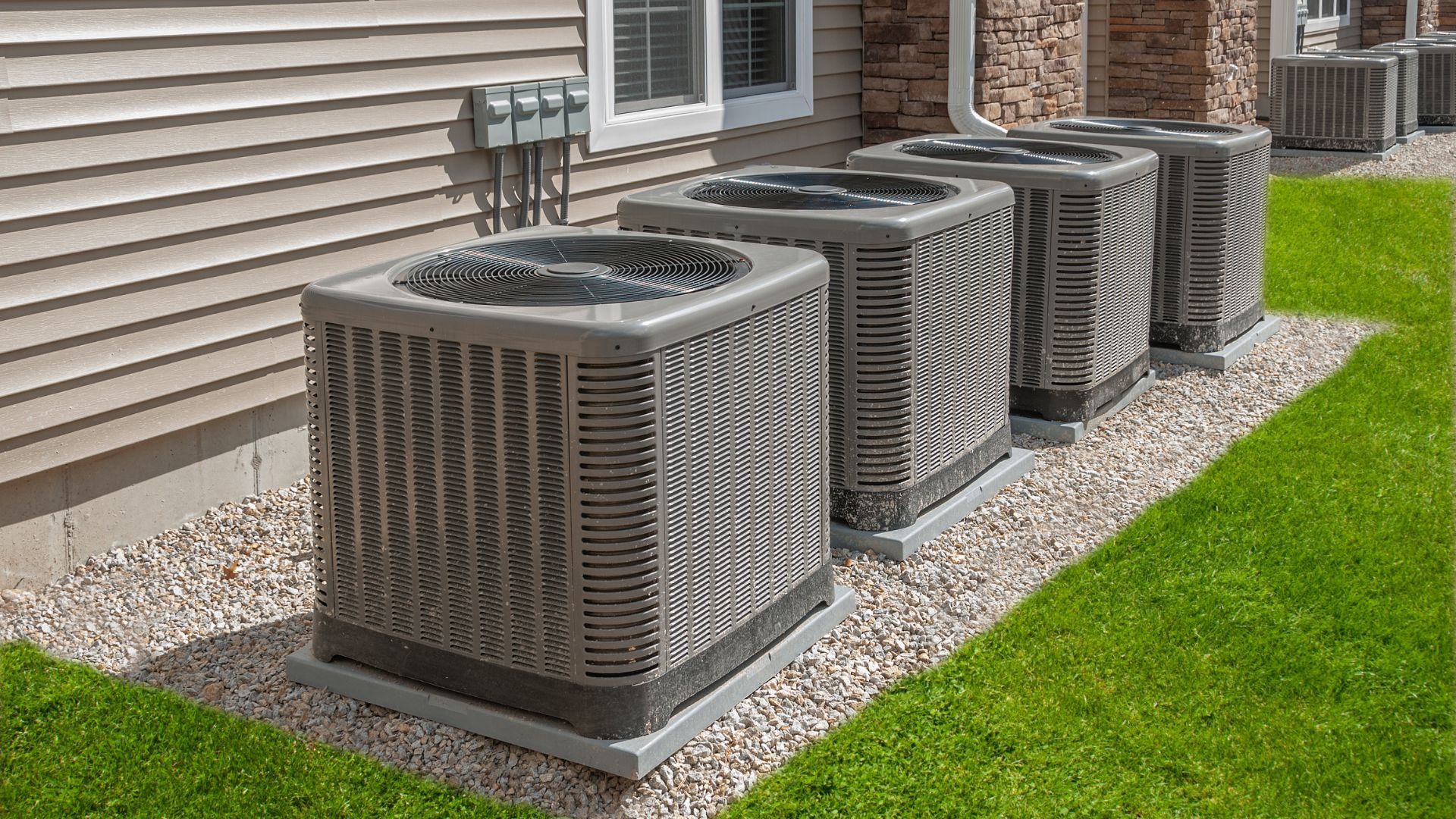
Variable-speed compressors are one of the most recent products in residential air conditioning. It’s a huge leap forward for getting the perfect indoor temperature most efficiently. And if you’re wondering “What’s the difference between single-stage, two-stage, and variable-speed compressors,” here’s the simple answer: Variable-speed compressors are the better choice. But you weren’t looking for the simple answer, were you? Let’s talk about why it’s the better choice. Understanding Traditional Air Conditioning Single-stage compressors are the most basic type, offering only one level of operation: high. This means they run at full capacity whenever they are on, cycling on and off throughout the day. Single-stage compressors blast your home with cold air and turn themselves off when they reach the temperature setting on your thermostat. For example, if you set the thermostat to 75 degrees, the air conditioner will run anytime indoor temperatures hit 76 degrees. After the AC cools the house back to 75 degrees, it will turn off again. There’s also a two-stage or dual-stage compressor that provides two distinct levels of operation: high and low. This allows for more efficient and flexible cooling compared to single-stage systems. A two-stage unit runs at full capacity when you need it to and at a lower level when you don’t. Two-stage units don’t run as continuously as a variable-speed AC, but they do cycle on and off less frequently than single-stage systems. Basics of Variable-Speed Air Conditioning Variable-speed compressors work differently. To maintain an indoor temperature that matches the setting on your thermostat, they operate continuously at less than 100% capacity – often as low as 25% or 30% capacity. As a result, they run for much longer cycles than single-stage AC units. In the summertime, they might run for all or most of the day! At this point, you’re probably thinking, “It’s hot out there! Why would I want an air conditioner that runs longer and cools my home slower?” Well, a variable-speed compressor’s longer run times dehumidify your home more effectively than the short cycles of a single-stage unit. One of the biggest problems with single-stage compressors is that they’re not running continuously. Relative humidity increases whenever the AC isn’t on, making you feel hotter and more uncomfortable. Most people deal with this problem by lowering the temperature on their thermostat, which brings us to the other benefit of variable-speed compressors: cost. The Cost of Comfort A single-stage compressor blasts your home with cold air before it turns itself off. Then it turns on again when the indoor temperature increases. Most of your air conditioner’s electricity draw occurs when it turns on, not while it’s running. In the summer, a single-stage compressor turns on and off a lot, known as “short cycling.” Short cycling can become an issue when it is above 95 degrees outside and you’re gaining heat about as fast as your A/C can remove it. Since single-stage compressors have short cycles, they draw a lot more electricity than a variable-speed unit that turns on and stays on (at a low speed) for hours. They also don’t dehumidify indoor air very well, forcing you to lower the temperature setting on your thermostat. As a result, the single-stage AC is much more expensive to operate! Two-stage compressors don’t turn on and off nearly as much. They’re more efficient than single-stage units, but not as efficient as variable-speed compressors. Variable-speed air conditioners run continuously, dehumidifying the air inside your home. As a result, you feel comfortable at higher temperatures and don’t have to set your thermostat so low. And since they don’t turn on as often, variable-speed AC units lower your energy bill . Are There Other Benefits? Believe it or not, more effective cooling and greater efficiency aren’t the only benefits of a variable-speed compressor. If you’re concerned about indoor air quality, opting for a two-stage or variable speed unit can help purify the air circulating your home , resulting in healthier conditions for you and your family. Since they dehumidify indoor air more effectively than a single-stage unit, a more efficient system helps you eliminate mold growth in bathrooms and kitchens, prevent dust mites, and create conditions that aren’t suitable for insect intruders. And since variable speed units run more frequently, they also filter your indoor air more effectively. More air is cycled through your return ducts – and your air filters – resulting in a lower volume of air contaminants. According to the American Lung Association , the average American spends 90% of their time inside, and 62% of that time inside their own home. Having cleaner air inside your home for yourself and your family is essential. Nowadays, you can look beyond “keeping cool” and improve many aspects of home comfort, all through your choice of air conditioning equipment. Variable speed technology is a big reason why. Looking for guidance on the best air conditioner for your Lincoln area home? Whether single-stage, two-stage, or variable speed, our team can help you choose the right system. Contact Custom Cooling and Heating today to find the right fit for you.
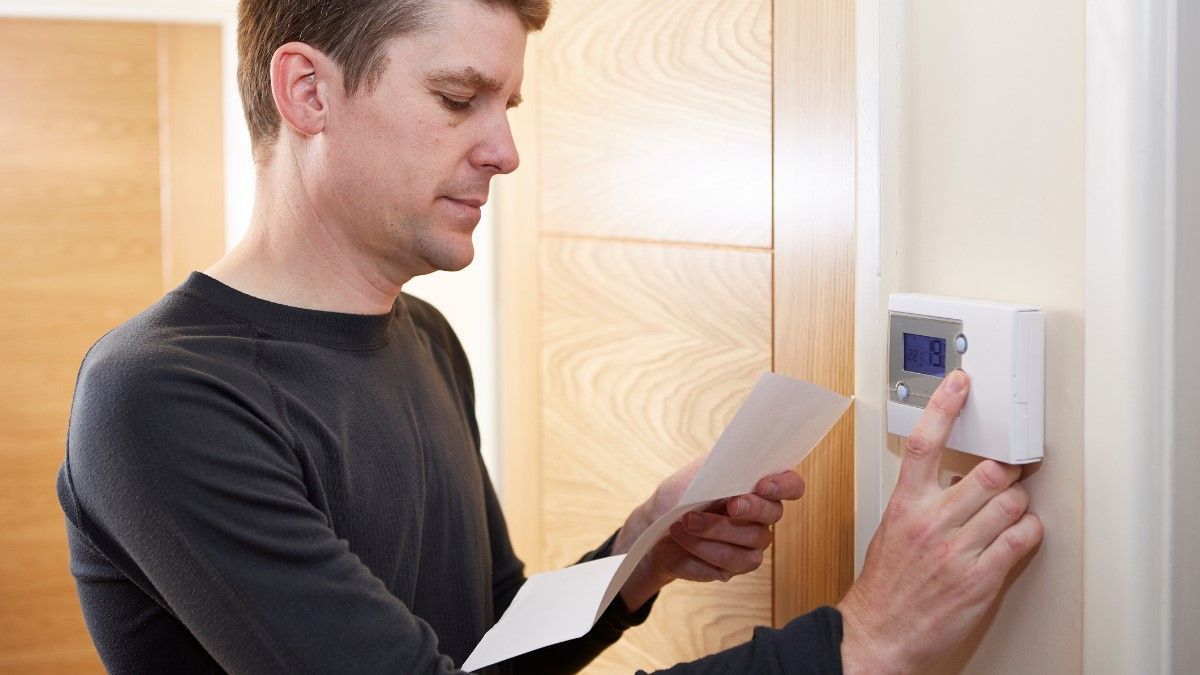
High energy bills can strain your budget and leave you asking the question: “Where is all that energy going?”. Luckily, there are steps you can take to identify these issues and make your home more energy efficient. Here are 5 ways to lower your energy bill. Identifying the Problem Before you can reduce your energy bill, it is important to understand why it is so high to begin with. Many factors contribute to high energy usage: Poor Insulation : poor insulation in your home can result in heat loss during the winter and heat gain during the summer, causing your heating and cooling systems to work harder and consume more energy . Old Appliances : Outdated appliances, such as refrigerators, dishwashers, water heaters, and especially your heating and cooling systems are less energy-efficient than newer models and can contribute to high energy bills . Air Leaks : Drafty windows, doors, and gaps in walls or ceilings allow conditioned air to escape and outdoor air to come into your home, leading to increased energy usage. Overuse of Electronics : Leaving electronic devices, lights, and appliances on when not in use can waste energy and raise your electricity bill. Inefficient Lighting : Traditional incandescent light bulbs consume more energy and generate more heat than energy-efficient alternatives like LEDs or CFLs.
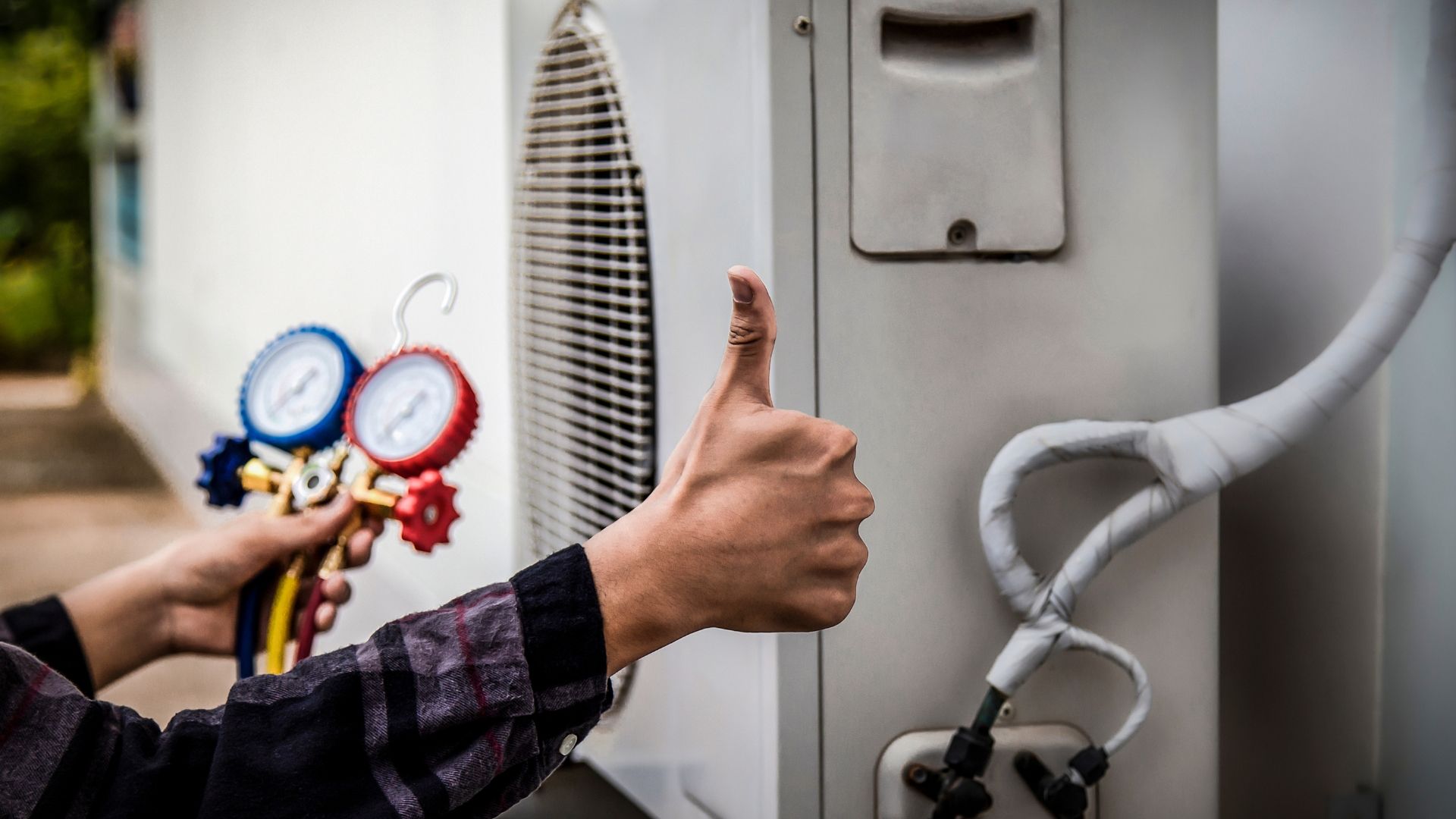
Ever felt like your house is stuck playing hot potato with the weather? Maybe it’s blazing in the summer, chilly in the winter, or even both? That's where a trusty HVAC system comes in, keeping your home comfortable year-round. But exactly what is an HVAC system, and how does it work its magic? Buckle up, because we're about to turn you into a home climate champion! 7 Ways an HVAC System Improves Your Home Breathe Easy with Freshly Circulated Air Banish the Blues with Temperature Control Good Riddance to Humidity! Sleep Like a Baby (Without Sweating)! Protect Your Home Energy Efficiency for Our Planet and Your Wallet Preserve Your Peace of Mind
